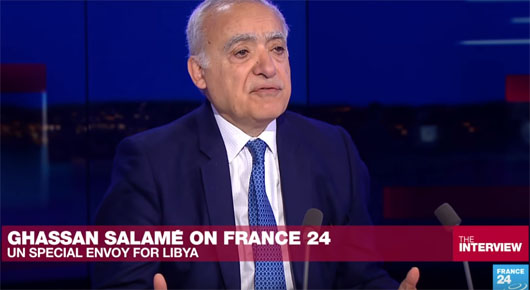Special to WorldTribune.com
UNITED NATIONS — Widening conflict is brewing in Libya, the North African country wracked by civil strife and embroiled in political chaos. Caught in this vortex of warring militias, human traffickers, and a weak internationally-backed government of sorts, remains a beleaguered UN effort to bring a political solution and peace to this violence plagued land.
Now in a stunningly candid assessment of the renewed crisis, the UN’s Special Representative Ghassan Salamé warned the Security Council, “Libya is on the verge of descending into a civil war which could lead to the permanent division of the country. The damage already done will take years to mend, and that’s only if the war is ended now. ”

In early April, UN Secretary General Antonio Guterres visited the capital Tripoli and seat of the internationally recognized but teetering Government of National Accord, (GNA). Tragically fighting broke out near Tripoli and rebel forces led by a powerful warlord advanced on the capital. Carefully planned UN mediation was shattered and embarrassed while emboldened militia forces resumed fighting.
Related: Egypt breaks with ‘Arab NATO’ over its ties with Libya’s Haftar, Beijing and Moscow, April 16, 2019
The UN’s Salamé recounted the latest round of Libya’s crisis where a country churning in chaos for eight years may have had a long shot to mediate and politically solve a crisis among warring factions. During the so-called Arab Spring of 2011, when pro-democracy movements challenged entrenched authoritarian regimes from Tunisia to Syria, Colonel Muammar Gadhafi’s Libya saw some of the most violent fighting take place.
Encouraged by popular uprisings in Benghazi in the east, the UN Security Council under strong pressure from the Obama Administration as well as Britain and France, led the charge for regime change. By toppling the tyrant Gadhafi, the West blundered and inadvertently subjected Libya to a shattered maze of militias, tribes, and warlords which have since plagued the land.
Libya’s entrenched instability was brutally illustrated to Americans in September 2012 when jihadi terrorists from the Ansar al-Sharia forces attacked and destroyed the U.S. Consulate in Benghazi killing the American Ambassador Chris Stephens as well as four State Department and CIA personnel. The still murky events in Benghazi have long haunted former Secretary of State Hillary Clinton who was off balance in reacting to the lethal assault.
As Ghassan Salamé told the Council, “I am no Cassandra, but the violence on the outskirts of Tripoli is just the start of a long and bloody war on the southern shores of the Mediterranean, imperiling the security of Libya’s immediate neighbors and the wider Mediterranean region.”
He added woefully that the security situation throughout Libya, “is already being exploited by Da’esh and Al Qaida. In the South of Libya, the black flags of Da’esh are appearing.”
A UN arms embargo slapped on the warring factions has become an open secret with both the GNA government receiving heavy weapons from Turkey while General Haftar’s powerful forces are being supplied by Jordan, the United Arab Emirates and Saudi Arabia. “Arms are pouring in again to all sides,” advised Salamé adding, “Without a robust enforcement mechanism, the arms embargo into Libya will become a cynical joke. Some nations are fueling this bloody conflict.”
Libya has emerged as a proxy conflict among Middle Eastern powers. France has equally backed General Haftar’s movement, yet has now nonetheless called for an immediate cease-fire.
Though hundreds have been killed and as many as 75,000 people displaced, the backstory to Libya’s renewed conflict concerns thousands of migrants who are trapped in detention centers. For years the unstable North African country has served as a nexus for human trafficking in which impoverished migrants from Sub-Saharan Africa are taken to Tripoli before being sent on makeshift vessels towards Italy. Some 3,500 migrants are stranded in Tripoli.
To its credit Tripoli’s GNA government has helped stem the flow of illegal migrants into Italy but given the renewed chaos, it’s unlikely that policing human trafficking would be a priority of a government under siege.
Though General Haftar recently met in Paris with President Emmanuel Macron, the Libyan strongman has rejected a French initiative for a ceasefire, claiming conditions were not right. Haftar’s considers that the UN-backed GNA government remains “completely infested by militias.”
Libya is composed of an uneasy and often changing alliance of well armed Islamic jihadi, nationalist and criminal militias. The primary danger for the West and especially Europe remains that this country sits geographically below Malta and Italy and thus can serve as a conduit for terrorists and an unending flood of human trafficking. Thus Libya’s instability is not localized but part of a wider North African storm rising.
John J. Metzler is a United Nations correspondent covering diplomatic and defense issues. He is the author of Divided Dynamism the Diplomacy of Separated Nations: Germany, Korea, China (2014). [See pre-2011 Archives]

 By
By